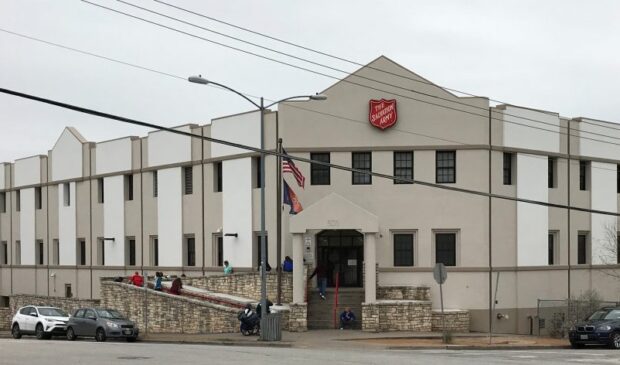Newsletter Signup
The Austin Monitor thanks its sponsors. Become one.
Most Popular Stories
- Council members celebrate unanimous defeat of bill that proposed putting Austin under state control
- A once-banned type of building is back in favor – and the Planning Commission approves
- East Austin’s ‘wishbone’ bridge takes shape as concrete beams almost span Lady Bird Lake
- Austin churches answer prayers for affordable housing – by building it themselves
- Audit shows former Austin Water employee directed search of boss’ inbox
-
Discover News By District
Popular Whispers

Photo by city of Austin
Salvation Army changes course on timing of downtown shelter closure after Council pressure
Tuesday, March 14, 2023 by Nina Hernandez
After a week of pressure from Mayor Kirk Watson, members of City Council and community activists, the Salvation Army announced Friday it would extend operations at its downtown shelter through April 30.
The extension is being funded by the city of Austin and is intended to allow time for the nonprofit to connect residents to other shelter beds or service providers.
The Salvation Army Austin Area Command initially announced via blog post on March 2 that it planned to close the facility March 15, citing high operational costs and the aging state of a shelter that’s been in use for nearly four decades. While expected, the nonprofit’s communications strategy and the short notice left shelter clients in crisis.
Upon receiving the news, an unknown number left the shelter without consulting staff. Representatives for the 32 who remained spoke at Council’s Public Health Committee meeting on March 8, requesting more time and support in order to access other services in Austin. Watson and several Council members, including Vanessa Fuentes, Ryan Alter, and Zo Qadri, expressed concerns about the Salvation Army’s handling of the closure.
On Friday, the city announced it would fund an extension of shelter operations for 30 days at a cost of up to $100,000. From now until April 30, the city’s Homeless Strategy Division and other service partners will work with the Salvation Army to continue placing clients in new temporary housing. Thus far, the efforts have secured arrangements for 50 Salvation Army clients. Those arrangements include local shelters, apartments secured by service providers, transitional housing programs, board and care homes, and in some cases hotel stays arranged through nonprofits.
City homeless strategy officer Dianna Grey thanked the Salvation Army in a statement for allowing for “a more thoughtful transition” than had previously been established.
“Addressing this crisis in such a short period of time has only been possible through the collaboration and creativity of our community partners – over a dozen of whom have stepped forward to offer shelter beds, housing and other resources,” Grey said.
In its own press release, the Salvation Army said it remains committed to its mission. “Despite reports to the contrary, the Salvation Army has always been committed to the safe exit of their downtown shelter brothers and sisters,” the statement reads.
Watson thanked city staff, the Homeless Strategy Division, and Austin Public Health for its work on the matter. “From day one, I’ve pushed the Salvation Army to keep the shelter open while they sell the building and they’ve finally relented, at least for the short term,” he said. “While this is a temporary solution to an emergency, the work done here represents the kind of responsive service the city is now delivering to all its residents.”
District 9 representative Qadri told the Austin Monitor he is grateful the city and the Salvation Army found a way to collaborate on a better process going forward. However, “the abrupt decision to close the facility in the first place created unnecessary disruption in the lives of some of our most vulnerable neighbors who need as much stability and support as we as a community can offer,” he said.
He continued: “I am committed to working with the Salvation Army, our city staff, and other providers to make sure we maintain a powerful sense of urgency to help these Austinites stay on a track towards permanent housing.”
The Austin Monitor’s work is made possible by donations from the community. Though our reporting covers donors from time to time, we are careful to keep business and editorial efforts separate while maintaining transparency. A complete list of donors is available here, and our code of ethics is explained here.
Posted In: Public Health, District 9
You're a community leader
And we’re honored you look to us for serious, in-depth news. You know a strong community needs local and dedicated watchdog reporting. We’re here for you and that won’t change. Now will you take the powerful next step and support our nonprofit news organization?







